Cortex-A8 SoC family gains automotive, industrial members
Nov 4, 2009 — by Eric Brown — from the LinuxDevices Archive — 35 viewsFreescale added four members to its ARM Cortex-A8 based i.MX51 family of system-on-chips (SoCs), supported with a Linux BSP and evaluation kit. The SoCs, which range in speed from 600MHz to 800MHz, include the automotive-focused i.MX514 and i.MX516, as well as the i.MX512 and i.MX513, which target various industrial and consumer devices, says Freescale.
Announced last January, the HD-capable i.MX51 family can be considered as a broad replacement for the popular ARM11-based i.MX31 line of applications processors, according to Freescale's Dan Loop, i.MX product manager at Freescale, whom we spoke to yesterday.
The i.MX51 is based on the ARM Cortex-A8 superscalar core, which enables instruction-level parallelism within a single processor. The i.MX51 family was initially launched in the form of an i.MX515 version of the SoC that targeted netbooks, or as Freescale later called them, echoing rival Qualcomm, smartbooks.
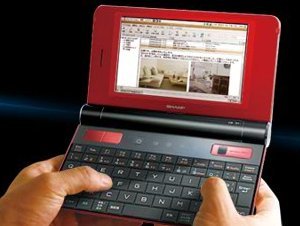
Sharp's i.MX515-based Netwalker
The i.MX51 SoCs integrate a multi-level cache system, OpenGL ES 2.0 and OpenVG 1.1 accelerators, power management features, and an autonomous Image Processing Unit (IPU) that offers image signal processing, image manipulation, and enhancement. Other touted features include CMOS camera sensor support, a variety of hardware video and audio codecs, and an LCD controller that supports both 24-bit primary (WXGA) and 18-bit secondary display ports.
Peripheral support, meanwhile, includes USB, Ethernet, and various serial interfaces. There are also MMC/SDIO expansion card interfaces, as well as ATA storage interfaces. In addition, the i.MX51 provides a variety of security features, including ARM TrustZone.
Four new family members
Freescale says the new members of its i.MX51 family are pin-compatible with the i.MX515 and one another, delivering a variety of video, graphics, and multimedia feature combinations. The SoCs support multiple memory types, including DDR2, the company adds.
The new i.MX512 and i.MX513 SoCs deliver 600MHz performance at industrial temperature ranges. The i.MX513 additionally incorporates hardware video encode/decode functionality, says Freescale.
Industrial applications for the i.MX512 and i.MX513 include printers, factory automation equipment, medical devices, digital signage, home appliances, and human-machine interface devices. Consumer-oriented versions of both SoCs are clocked at 800MHz, and target devices including e-readers, IP cameras, and VoIP media phones, says the company.
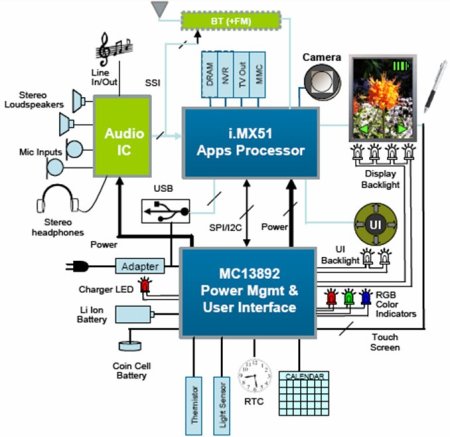
i.MX51 SoC in typical consumer electronics device design
(Click to enlarge)
The automotive-oriented i.MX514 and i.MX516 processors, meanwhile, are clocked at 600MHz at automotive temperature ranges, says Freescale. The SoCs are said to be AEC-Q100 qualified devices, which means they have been rated by the Automotive Electronics Council (AEC) Component Technical Committee as being suitable for use in harsh automotive environments.
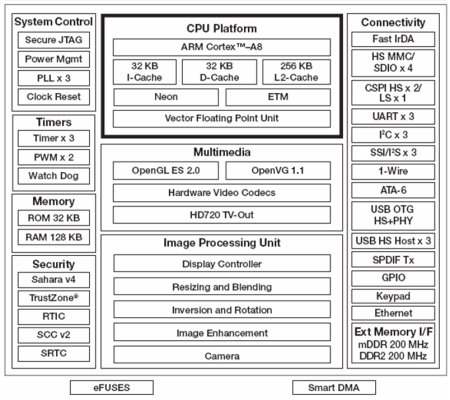
Block diagram for the high-end automotive part, the i.MX516
(Click to enlarge)
Designed for both in-dash and after-market automotive applications, the i.MX514 and i.MX516 (above) add OpenGL ES 2.0 graphics acceleration, which has been removed from the lower cost i.MX512 and i.MX513 parts.
The automotive SoCs have already been chosen by several automotive OEMs for multimedia infotainment systems that will begin production in 2010, says the company. Ideal applications are said to include display-based instrument clusters, as well as navigation, telematics, and infotainment platforms. The i.MX516 also provides a video encode/decode hardware engine similar to the one offered by the i.MX513, says Freescale.
An evaluation kit and new power management IC
A $700 hardware evaluation kit (below) features a 5.0 x 5.0-inch development board, plus interlocking LCD and expansion boards, says Freescale. Similar to previous i.MX "PDK" kits, the evaluation system ships with pre-loaded software images for both Linux and Windows Embedded CE.
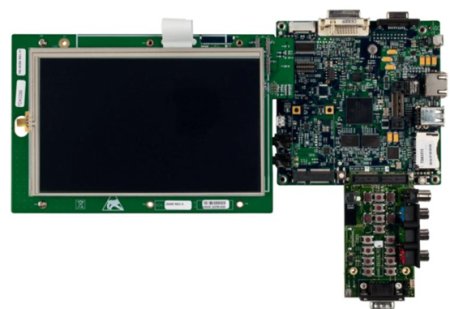
i.MX51 development kit, shown assembled with LCD and expansion boards
(Click to enlarge)According to Freescale, the evaluation kit also includes an important addition to the i.MX51, a separate power management IC, called the MC13892. This IC integrates a variety of discrete functions, contributing to reduced device size and weight while extending battery life, claims Freescale.
The chip incorporates a battery charging system, plus four adjustable buck converters for powering the processor core and memory, says the company. Also included are two boost converters for LCD backlighting and RGB LED displays, along with serial backlighting drivers for display and keypad (see block diagram below).
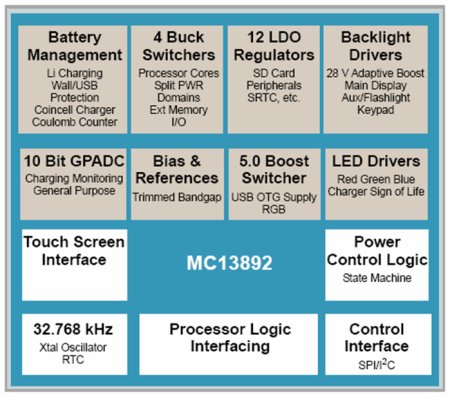
MC13892 power management IC block diagram
(Click to enlarge)
BSPs for Linux and Android (sort of)
Board support packages (BSPs) are said to be provided for Linux and Windows Embedded CE 6.0. Meanwhile, Freescale will work with developers to provide access to a still incomplete Android BSP, which will formally ship later, said Loop. Alternatively, developers can start working with the Linux BSP and the evaluation kit, and then add Android support later, he said.
According to Loop, Android is hardly an afterthought for these SoCs, especially in automotive infotainment systems where "a lot of our Tier One customers are looking to use Android." In fact, Loop expects Android to soon predominate "wherever you need touch-based UIs or more advanced connectivity, anything with WiFi." He added, "We're doing a lot of work on the Android BSP right now, optimizing Google code specifically for our hardware, especially to take advantage of power management."
The Linux BSP is based on a 2.6 kernel and supports all peripherals on the i.MX51 devices, while offering optimized drivers for the i.MX51's graphics and video hardware accelerators, says Freescale. The Linux BSP also offers Debian-based Linux distributions, including the GNOME desktop and Ubuntu, layered on top of the BSP, says the company.
Freescale also offers numerous multimedia codecs that are either fully accelerated using the i.MX51's hardware video processing core or optimized for the ARM Cortex-A8 processor architecture using ARM's Neon instruction set, says Freescale. Codecs are said to include framework components such as parsers and plugins, which are required by the corresponding BSP. These include DirectShow for Windows Embedded, GStreamer for GNOME and Ubuntu, and OpenMAX for Android. Optimized graphics middleware for X Window System, OpenGL-ES, and OpenVG graphics engines are also provided.
So-called "embedded enablement leaders" that have promised support for the i.MX51 family are said to include Adeneo, AllGo, ARM, BlueTechnix, Bsquare, Canonical, CodeSourcery, Digi, Eukrea, Genesi, Green Hills, ICytecture, Ka-Ro, Mentor, MontaVista, QNX, Trinity Convergence, TWS, and Wind River.
Competing ARM Cortex-A8 SoCs, meanwhile, include Texas Instruments' OMAP3x line of SoCs, as well as more recently, the Samsung S5PC110 (smartphones) and S5PV210 (netbooks) SoCs. Other licensees of the Cortex-A8 include STMicroelectronics, Broadcom, PMC-Sierra, and Panasonic.
Availability
Freescale is now sampling the general-purpose i.MX512 and i.MX513, as well as the automotive-focused i.MX514 and i.MX516 SoCs, with pricing starting at less than $20 in small quantities. The first new products incorporating the processors are expected to ship starting in the first quarter of 2010.
The i.MX51 evaluation kit is available for order now (part number MCIMX51EVKJ), for less than $700 suggested resale. More information about Freescale's i.MX51 may be found here.
This article was originally published on LinuxDevices.com and has been donated to the open source community by QuinStreet Inc. Please visit LinuxToday.com for up-to-date news and articles about Linux and open source.